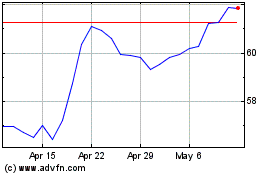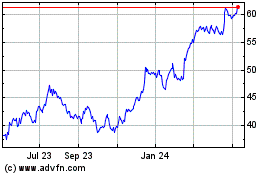By Rachel Louise Ensign and David Benoit
Wells Fargo & Co. is having trouble getting top bankers
interested in its open chief executive officer job.
The bank's board has approached a small group of top candidates,
including JPMorgan Chase & Co. consumer banking chief Gordon
Smith, PNC Financial Services Group Inc. CEO William Demchak and
former U.S. Bancorp chief Richard Davis, according to people
familiar with the matter. Messrs. Demchak and Davis took a pass on
potentially replacing Timothy Sloan, who resigned in late March,
the people said.
Wells Fargo continues to pursue Mr. Smith, who is JPMorgan's
co-chief operating officer, but he has told confidants that he is
reluctant to take the job and is likely to stay at JPMorgan, some
of the people said.
Running the fourth-largest bank in the U.S. is one of the
biggest jobs in the business, but it is not a universally appealing
one. Wells Fargo's new CEO will have to juggle fixing problems in
Washington, reviving key businesses and rehabilitating a corporate
reputation damaged by many problems that came to light following
the bank's 2016 fake-account scandal.
Any professional glory to be earned turning around the bank is
likely years away. Wells Fargo has a long to-do list from
regulators and is operating under an unprecedented growth cap
imposed by the Federal Reserve in early 2018.
Mr. Smith, 60 years old, oversees JPMorgan's consumer operations
and its commercial bank. He is considered a top candidate to run
the bank if Chief Executive James Dimon departs suddenly, but his
age makes him less likely to get the job if Mr. Dimon retires in
around four years, as planned.
Mr. Smith would be an expensive hire. He is owed more than $50
million in long-term compensation, some of which Wells Fargo likely
would have to cover. The British-born executive, who joined
JPMorgan in 2007 from American Express Co., was paid $22 million in
2018.
It is unusual for big, publicly traded companies to go months
without a permanent CEO, let alone a bank the size of Wells Fargo.
Boards typically line up successors years ahead of time. The most
recent big bank in a similar situation was the financial-crisis-era
Bank of America Corp., which took nearly three months to name a
replacement after Kenneth Lewis announced plans to retire.
Wells Fargo's general counsel, former Cravath, Swaine &
Moore LLP partner C. Allen Parker, has been serving as interim CEO
since Mr. Sloan's departure.
Prominent figures in the banking business have puzzled over the
board's approach to the search, publicly and privately. Mr. Dimon
recently took Wells Fargo directors to task for their succession
planning.
"It's not responsible for a company -- just my own view -- to
have a CEO leave with no plan in place," he said at an investor
conference in late May. "I don't personally understand that."
Whatever succession planning the board had done was upended when
Mr. Sloan, a 31-year Wells Fargo veteran, resigned. Finance chief
John Shrewsberry had been considered a potential successor, people
familiar with the matter said, but the board decided to look for an
outsider after the Office of the Comptroller of the Currency and
the Federal Reserve, the bank's main overseers in Washington,
expressed dissatisfaction with its response to its troubles.
There are other factors complicating the search. Warren Buffett,
whose Berkshire Hathaway Inc. is the bank's largest shareholder,
spoke out against hiring anyone with Wall Street roots. Regulators,
too, are taking an active role in the process.
The OCC must approve the new CEO under the terms of an agreement
the bank entered into last year. The regulator has sent the bank a
letter that outlines what it expects it to do in the process of
vetting potential candidates, according to people familiar with the
matter.
The CEO search got off to a slow start. Once Mr. Sloan's
departure was announced, it took the board weeks to hire an
executive search firm.
The firm, Spencer Stuart, started with the small group of top
candidates, including Messrs. Demchak, Smith and Davis, with
extensive experience in Main Street banking, according to people
familiar with the matter. Mr. Demchak said he had no plans to leave
PNC on his bank's quarterly earnings call in April; he and Mr.
Davis told Wells Fargo representatives that they don't want the
job, some of the people said.
The CEO search has set off a guessing game around the banking
business. Yet some people considered worthy candidates by their
peers recently hadn't heard from recruiters, according to people
familiar with the matter.
That could reflect the influence of Berkshire Hathaway, which
owns 9% of the bank's shares.
In an April interview with the Financial Times, Mr. Buffett said
Wells Fargo's new CEO "shouldn't come from Wall Street" and
"probably shouldn't come from JPMorgan or Goldman Sachs." Berkshire
Vice Chairman Charlie Munger told The Wall Street Journal "we don't
like the Wall Street crowd that is making the damn decisions."
That hasn't stopped employees at rival banks from speculating
about their executives landing the job. On April 1, Citigroup Inc.
employees emailed each other a fake Wall Street Journal article
that said the bank's Latin America head Jane Fraser would replace
Mr. Sloan.
--Andrew Ackerman and Liz Hoffman contributed to this
article.
Write to Rachel Louise Ensign at rachel.ensign@wsj.com and David
Benoit at david.benoit@wsj.com
(END) Dow Jones Newswires
June 11, 2019 09:51 ET (13:51 GMT)
Copyright (c) 2019 Dow Jones & Company, Inc.
Wells Fargo (NYSE:WFC)
Historical Stock Chart
From Mar 2024 to Apr 2024

Wells Fargo (NYSE:WFC)
Historical Stock Chart
From Apr 2023 to Apr 2024
